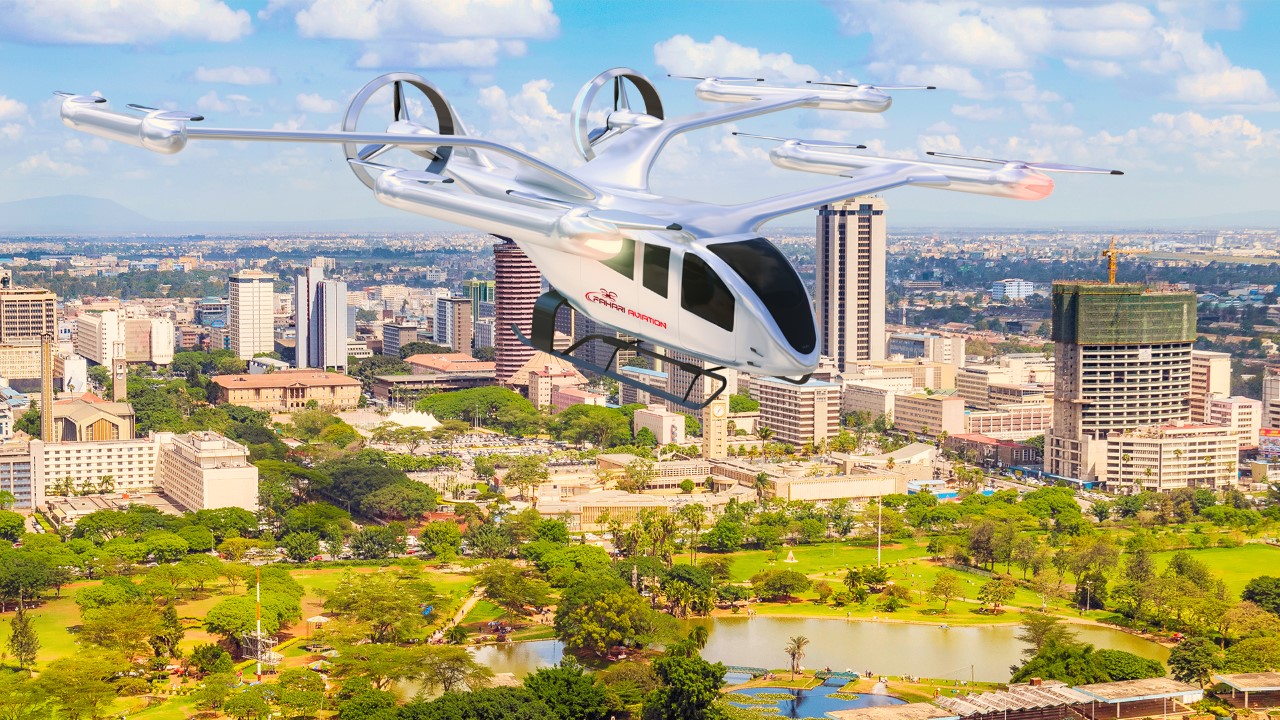KQ Drone License to cost pilots KSH 180,000
Aspiring drone pilots seeking to train with Kenya Airways will part with Sh180,000 for a month course to obtain a Remote Pilot License (RPL) as the national carrier moves to diversify its revenue stream in the wake of low demand for passengers.KQ, through its Fahari subsidiary, has opened a training course for those interested in operating drones but do not have licenses, which is a prerequisite by the civil aviation agency. KQ's technical director Evans Kihara in response to Business Daily queries, said the charges would exclude obtaining a Class 3 aviation medical exam which costs about Sh10,000. "We have an introductory price of Sh180,000 for a Remote Pilot License (RPL) training course. The training will take four weeks and comprise theory and practical sessions," said Mr. Kihara.
For more information, go to READ MORE.
Eve and Fahari Aviation sign a Letter of Intent (LoI) for up to 40 electric Vertical Take-Off and Landing (eVTOL) aircraft.

The journey to realize the dream of eVTOL vehicles in Kenya is on course, and the partnership with Eve is a key achievement for us as part of the strategy to adopt new technologies as a growth strategy for the sustainable development of Africa,” said Allan Kilavuka, Group Managing Director and Chief Executive Officer of Kenya Airways. For more information, go to READ MORE.
Fahari pilots a new approach to Kenya's wildlife census with UAS
Fahari Aviation's drones and crew piloted the use of drones in the exercise to establish a national baseline of wildlife populations and their distribution in Kenya. The Kenya Wildlife Service (KWS) and the newly established Wildlife Research and Training Institute (WRTI) coordinated the census with financial support from the national government. Fahari Aviation aims to pilot the beneficial use of drones and uncrewed aircraft in supporting vast ecosystems and wildlife conservation efforts. This includes their cost effectiveness in operations while still achieving the desired data output results.
For more information, go to READ MORE.
THE CIVIL AVIATION (UNMANNED AIRCRAFT SYSTEMS) REGULATIONS, 2020
General Rules for Flying a Drone in Kenya
Based on our research and interpretation of the laws, here are the most important rules for flying a drone in Kenya.
- A Kenyan citizen or resident must be at least 18 years old to own and operate a drone (Applicants should have a company registered in Kenya).
- Importing or exporting drones is only allowed with the approval of the KCAA.
- A person shall not transfer ownership of a drone without the approval of the KCAA.
- Operators must register drones with the Authority and be issued a registration certificate.
- All drone operations must be conducted under a specific operational category based on risk factors.
- Commercial drone operations require operators to obtain a Remote Aircraft Operators Certificate (ROC) from the Authority.
- Drones shall not fly above 400 feet AGL or within (164 feet) 50 meters of any person, vessel, or vehicle not part of the operation.
- A pilot shall not fly a drone in non-Visual Meteorological Conditions or at night unless authorized by the Authority.
- No person shall operate an Unmanned Aircraft System over a public road or along a public road at a distance of less than (164 feet) and 50 meters.
- A public roadway shall not be used as a place for the landing or take-off of a drone.
- Operating a drone within 10 kilometers of an airport from the airport reference point for code C, D, E, and F airports is prohibited without authorization.
- Operating a drone within 7 kilometers of an airport from the airport reference point for code A and B airports is prohibited without authorization.
For more information on drone laws in Kenya, see this page on the KCAA WEBSITE.
Know something we don't know about drone laws in Kenya? Please send us an email at fly@fahari-aviation.com
We strive to keep this page up-to-date for drone pilots and enthusiasts. Given the pace of the drone industry and evolving regulations are evolving, feel free to reach out to us with updated information that may not be appearing on our site.
LEAPFROGGING INTO THE FUTURE: DRONES IN SUB-SAHARAN AFRICA
Drones in Sub-Saharan Africa have a complicated past. For most of this century, drones have been used for military purposes. Thanks to this and a lack of well-established infrastructure, many people do not associate commercial drone technology with the African continent. Some argue that the African continent must fully industrialize before developing drone technologies. However, research shows that almost the exact opposite is true.
For more information, go to READ MORE.
AFRICAN EXPERIMENTS WITH DRONE TECHNOLOGIES COULD LEAPFROG DECADES OF INFRASTRUCTURE NEGLECT
A drone revolution is coming to sub-Saharan Africa. Countries across the continent are experimenting with this 21st-century technology as a way to leapfrog decades of neglect of 20th-century infrastructure. Africa's commercial drone history is compressed to a handful of projects and countries within the last 5-7 years. Several governments have jumped out ahead on UAV policy. Over the last year and a half, Kenya, Ghana, and Tanzania have issued or updated drone regulatory guidelines and announced future UAV initiatives.
For more information, go to READ MORE.